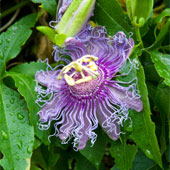Passionflower - Natural Health Product
Non-traditional solutions to help boost your health and wellness.
Passionflower
General Information
Passionflower was given its name by Spanish explorers and missionaries in South America, who used parts of the flower as allegories for parts of the passion (suffering and crucifixion) of Jesus. The active ingredients that give passionflower its medicinal properties come from the aerial (above-ground) parts of the plant.
Common Name(s)
Scientific Name(s)
Passiflora incarnata

How is this product usually used?
Passionflower is taken by mouth. The aerial parts of the plant is prepared into tea, infusion, tincture or fluid extract. The usual dose of passionflower for individuals 12 years and older is 0.25 g to 8 g of dried aerial parts per day, usually divided into 1 to 4 doses.
Your health care provider may have recommended using this product in other ways. Contact a health care provider if you have questions.
What is this product used for?
Passionflower is used for restlessness and nervousness, anxiety, and as a sleep aid.
Passionflower may be effective at reducing the symptoms of anxiety. There is insufficient research to show passionflower is effective in treating restlessness, and for its use as a sleep aid.
Your health care provider may have recommended this product for other conditions. Contact a health care provider if you have questions.
What else should I be aware of?
Passionflower is likely safe for most individuals when taken in recommended amounts for up to 2 months. Reported side effects include dizziness, drowsiness, confusion, and hypersensitivity. Passionflower can cause drowsiness. Do not drive or perform any activities requiring mental alertness if passionflower affects you this way.
Passionflower may increase the effect of sedating medications. Do not use alcohol while taking passionflower.
See your doctor if your symptoms persist (for longer than 4 weeks) or worsen when taking passionflower.
Consult a health care provider if you are thinking of taking passionflower while pregnant or breast-feeding.
Stop taking passionflower at least 2 weeks before surgeries.
Do not use passionflower if you:
- are allergic to passionflower or any other plant in the family of Passifloraceae
- are pregnant
Before taking any new medications, including natural health products, speak to your physician, pharmacist, or other health care provider. Tell your health care provider about any natural health products you may be taking.
Source(s)
- Health Canada. Drugs & Health Products. Monograph – Passionflower. https://webprod.hc-sc.gc.ca/nhpid-bdipsn/atReq.do?atid=passionflower.passiflore&lang=eng
- Natural Database. Natural Medicines Comprehensive Database. Passionflower.
All material copyright MediResource Inc. 1996 – 2020. Terms and conditions of use. The contents herein are for informational purposes only. Always seek the advice of your physician or other qualified health provider with any questions you may have regarding a medical condition.


